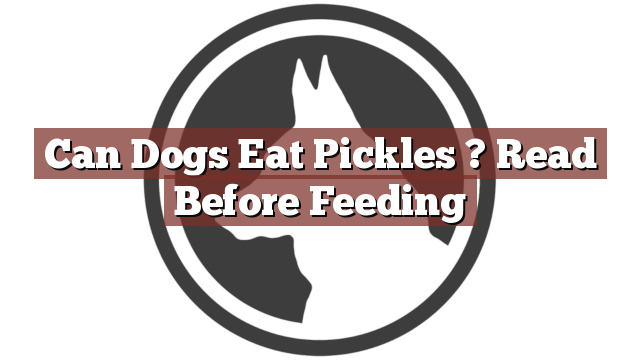Understanding Your Dog’s Dietary Needs
As a responsible pet owner, it is crucial to understand your dog’s dietary needs. Providing a balanced and nutritious diet is essential for their overall health and well-being. While dogs primarily thrive on a diet of meat, they can also benefit from certain fruits and vegetables. However, not all human foods are safe for dogs to consume. It is important to be aware of which foods are safe and beneficial for your furry friend.
Can Dogs Eat Pickles? Read Before Feeding
Can dogs eat pickles? This is a common question among dog owners who may be tempted to share their love for pickles with their canine companions. The answer to this question is no. Dogs should not be fed pickles or any food that contains high levels of salt, such as pickles preserved in brine. While a small bite of pickle may not cause immediate harm, prolonged consumption can lead to various health issues in dogs.
Pickles are typically made by fermenting or pickling cucumbers in a solution of vinegar, water, and high amounts of salt. The excessive salt content can be harmful to dogs as it can disrupt their electrolyte balance and cause dehydration. Additionally, the high sodium levels in pickles can lead to increased blood pressure and potentially damage your dog’s kidneys over time.
Pros and Cons of Feeding Pickles to Dogs
Feeding pickles to your dog can have both pros and cons. On the positive side, pickles are low in calories and fat, which may be beneficial for dogs on a weight management plan. They also contain some nutrients like vitamin C and calcium. However, the cons outweigh the pros when it comes to pickles. The high sodium content in pickles can put your dog at risk of sodium poisoning, leading to symptoms like excessive thirst, vomiting, diarrhea, and even seizures.
It is important to note that pickles preserved in brine or those that contain added flavorings like garlic or onion should be strictly avoided. Garlic and onion, in any form, can be toxic to dogs and cause serious health problems. If you want to incorporate vegetables into your dog’s diet, it is safer to opt for dog-friendly options like carrots or green beans that are low in sodium and have added nutritional value.
Conclusion: Considerations for Feeding Pickles to Your Dog
In conclusion, dogs should not eat pickles or any food with high salt content. While pickles themselves may not be toxic to dogs, the excessive salt levels can be harmful to their health. It is always better to err on the side of caution and avoid feeding your dog pickles altogether. If you have any concerns about your dog’s diet or if your dog has accidentally consumed pickles, it is best to consult with a veterinarian for appropriate guidance. Remember, a well-balanced canine diet should consist mainly of high-quality dog food specifically formulated to meet their nutritional needs.
Thank you for taking the time to read through our exploration of [page_title]. As every dog lover knows, our furry friends have unique dietary needs and responses, often varying from one canine to another. This is why it's paramount to approach any changes in their diet with caution and knowledge.
Before introducing any new treats or making alterations to your dog's diet based on our insights, it's crucial to consult with a veterinarian about [page_title]. Their expertise ensures that the choices you make are well-suited to your particular pet's health and well-being.
Even seemingly harmless foods can sometimes lead to allergic reactions or digestive issues, which is why monitoring your dog after introducing any new food item is essential.
The content provided here on [page_title] is crafted with care, thorough research, and a genuine love for dogs. Nevertheless, it serves as a general guideline and should not be considered a substitute for professional veterinary advice.
Always prioritize the expert insights of your veterinarian, and remember that the health and happiness of your furry companion come first.
May your journey with your pet continue to be filled with joy, love, and safe culinary adventures. Happy reading, and even happier snacking for your canine friend!

